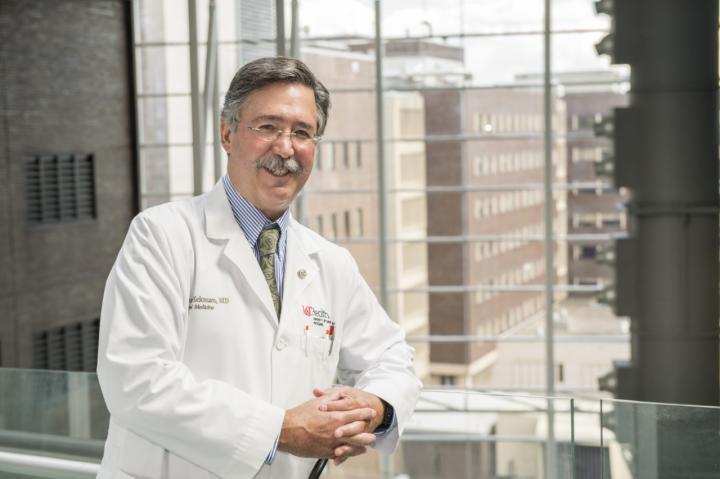
Credit: Colleen Kelley/UC Creative Services
A new medical approach recommended by University of Cincinnati physician-researchers may reduce organ wait times, save money, boost quality of life and prolong life expectancy for kidney patients.
According to a computer analysis conducted by faculty in the UC College of Medicine, using kidneys from hepatitis C (HCV)-infected donors for transplant in non-HCV-infected dialysis patients and then treating the infection afterward could reduce the average wait for a kidney from four years to 1.56 years. That’s a reduction of 61 percent.
“This matters because patients on dialysis have a much higher risk of dying each year,” said Mark Eckman, professor and director of the UC Division of General Internal Medicine. “Patients receiving hemodialysis face an excess mortality rate as high as 15% per year, while the mortality rate for patients receiving kidney transplants is 2% annually. If we can shorten the amount of time that patients need to live on hemodialysis, survival can improve.”
The findings are available online in the American Journal of Kidney Diseases and Eckman, also a UC Health physician, is the study’s lead author.
The computerized decision analytic model uses data from United Network for Organ Sharing and the Scientific Registry of Transplant Recipients to establish an average wait time for dialysis patients of four years for a non-infected kidney, said Eckman.
In the United States, roughly 103,000 patients are waitlisted for kidney transplantation. In 2018, only 14,725 or 4% received kidney transplants, said Eckman.
The computer model shows results for both effectiveness, measured in quality-adjusted life years, as well as cost. Patients receiving transplants with an HCV-infected kidney gained nearly 10 months in quality-adjusted life expectancy compared with those who waited longer for transplantation with a kidney not infected with HCV. Quality-adjusted life years take into account duration of survival and the quality of those years.
Eckman says the quality of life during the time following kidney transplantation is higher than that for the years a patient remains on dialysis.
There is also a cost savings of $37,918 over the life of the patient when someone accepts an HCV-infected kidney and is then treated for hepatitis C compared to waiting for a non-infected kidney and continuing dialysis in the process, according to computer analysis. Eckman said patients receiving hemodialysis have medical costs exceeding $95,000 annually, while costs after transplantation surgery are roughly $36,000 per year. Physicians can now cure hepatitis C thanks to a new 12-week treatment regimen.
The latest findings showing possible benefits for transplanting HCV-infected kidneys into patients not infected with hepatitis C mirror a 2018 study authored by Eckman that also found a benefit in transplanting HCV-infected kidneys into patients already infected with hepatitis C.
The decision analytic model simulates events occurring over time looking at two different strategies. One strategy uses kidneys from a non-HCV-infected donor while the other uses kidneys from an HCV-infected donor. Many factors affect waiting time for a donated kidney such as blood type and location of a patient’s transplant center. The increased availability of HCV-infected kidneys is largely the result of a surge in the number of deaths from opioid-related drug overdoses, said Eckman.
Hemodialysis is tough on the body and is an important factor in patients seeking a kidney replacement, said Eckman.
“Patients on dialysis have large shifts of fluid volume and rebalancing of electrolytes during each dialysis session that typically occur three times a week,” said Eckman. “That creates physiological stresses. A large part of the mortality associated with dialysis is due to cardiovascular events, some of which may be related to the volume shifts, changes in blood pressure and changes in electrolytes that accompany dialysis.”
A patient’s quality of life is also impacted; dialysis patients spend three-hour sessions three times a week hooked up to a dialysis machine, said Eckman. “It’s hard to travel anywhere since you are tethered to the dialysis center. Thus the quality of life while receiving chronic dialysis is not as good as that of a patient following a kidney transplant. Anything that can shorten the number of years the patient is on dialysis waiting for a transplant is an improvement. That’s the benefit of accepting an HCV-infected kidney.”
###
Other University of Cincinnati authors contributing to the study are Dr. E. Steve Woodle, chief of the Division of Transplantation and William A. Altemeier Professor of Research Surgery; Dr. Charuhas Thakar, professor and director of the Division of Nephrology Kidney CARE Program; Rita Alloway, research professor in the Division of Nephrology and Dr. Kenneth E. Sherman, Gould Professor of Medicine and director of the Division of Digestive Diseases. Thakar and Sherman are UC Health physicians. Alloway is director of Transplant Clinical Research at UC Health. Woodle is director of Solid Organ Transplantation for UC Health.
Dr. Sherman has grants/contracts (institutional funding) from AbbVie, Bristol-Myers Squibb, Gilead Sciences, Inovio Pharmaceuticals, Intercept Pharmaceuticals, MedImmune and Merck, and serves on advisory boards for Abbott Laboratories, Gilead, MedImmune, Merck and Shionogi. He also serves on safety monitoring boards for Watermark Research Partners and MedPace.
Thakar is a consultant to Merck and NxStage. He has investigator-initiated funding from Bioporto and Otsuka Pharmaceutical. Woodle has received clinical trial funding from AbbVie.
Media Contact
Cedric Ricks
[email protected]
260-415-8554
Original Source
https:/




